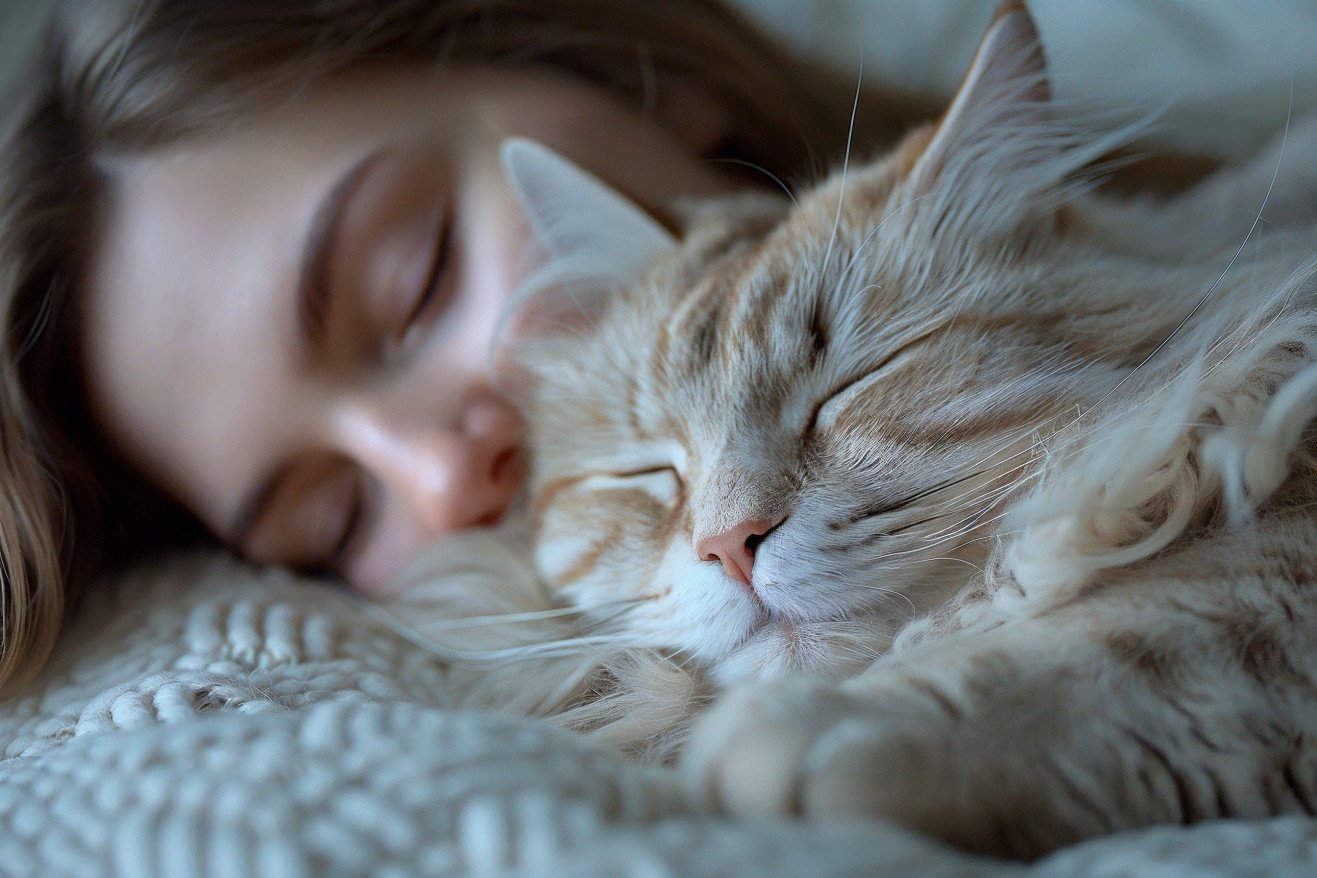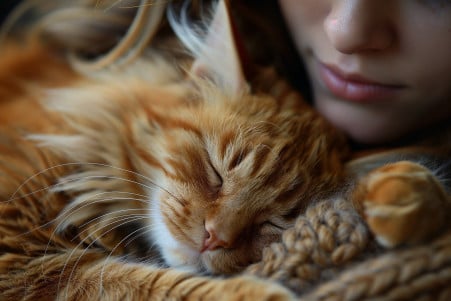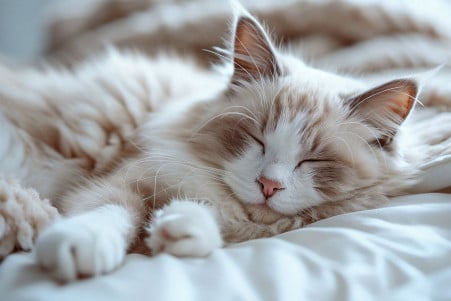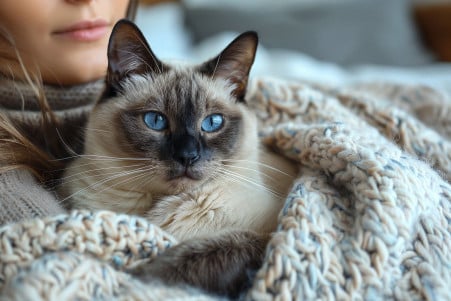Why Does My Cat Sleep On My Head? The Reasons Revealed
5 June 2024 • Updated 5 June 2024

If you've ever had a cat, you've probably experienced the phenomenon of your cat sleeping on your head. Even if you've provided your pet with a comfortable bed, they still seem to prefer this less-than-ideal location. So why do cats sleep on their owner's heads? There are several reasons, including scent-marking behavior, a desire for warmth and security, a way to show affection, a way to get attention, and, of course, because they're cats.
While you may find this behavior endearing or frustrating, depending on your perspective, researchers have looked into the biological and behavioral reasons behind it. In this article, we'll explore the work of animal behaviorists, veterinarians, and cat cognition experts to explain why cats like to sleep on their owner's heads and what it means for your relationship with your cat.
Why does my cat sleep on my head?
The Science Behind Scent-Marking and Territorial Behavior
Cats have an innate drive to mark their territory through scent-marking behavior. As explained in this article from BetterVet, they have scent glands around their faces, paws, and other body parts that release pheromones. By rubbing against objects or people, cats deposit these pheromones to claim their space and feel secure.
Sleeping on an owner's head allows cats to transfer their unique scent onto a familiar, safe surface - reinforcing the bond with their human companions. This scent-marking is a natural instinct deeply rooted in feline behavior, observed in both domestic cats and their wild counterparts like lions and tigers.
As Dutch.com explains, a cat's scent can be very comforting to them. Your head and pillow carry your familiar smell, so nestling there satisfies their territorial instincts while providing a cozy, reassuring environment.
Understanding this innate scent-marking drive helps owners appreciate why their cat might favor sleeping on their head. Providing ample scratching posts and accepting some scent-marking can create a comfortable, low-stress living situation that meets your cat's natural needs.
By depositing their scent in this way, cats reinforce their sense of belonging and security - an instinctive behavior shared across the feline family. This biological drive, combined with the warmth and affection factors explored next, sheds light on why your cat may choose your head as prime sleeping real estate.
Seeking Warmth and Comfort: The Appeal of a Cozy Sleeping Spot
Cats have a higher body temperature than humans, ranging from 100.4°F to 102.5°F, and are naturally drawn to warm spots for sleeping, as explained in this article from Dutch.com. The head and face area of their human companions often provide a warm and cozy resting place, satisfying this innate need.
Sleeping on or near their owners can also provide a sense of security and comfort for cats, reminiscent of huddling with littermates as kittens. Catster notes that cats may find the steady rhythm of their owners' breathing and heartbeat soothing, further contributing to their preference for sleeping on or near the head.
If this behavior is causing disruptions, Daily Paws suggests providing alternative warm and comfortable sleeping spots, such as heated cat beds or blankets, to help discourage cats from sleeping on their owners' heads. This can create a more harmonious living situation while still meeting the cat's need for warmth and security.
Attachment and Socialization: Why Do Cats Sleep on Your Head?
Cats that sleep on or near their owners' heads may be doing so to bond and show affection to their humans. According to BetterVet, cats often consider their owners to be part of their social group and may want to sleep close to them to maintain that social bond. This is especially true for cats that are more attached to their owners or that were well-socialized as kittens.
While it may be annoying, this behavior can also be seen as a sign of affection and trust. According to Dutch.com, cats sleep on or near their owners' heads because they feel safe and secure in their scent and presence, and sleeping close to their owner's head allows them to feel even more connected. Regular play, grooming, and positive interactions can help cats and their owners bond, and this behavior can be seen as a sign of that bond.
While this behavior can be frustrating, especially if it leads to sleep disturbances, recognizing it as a sign of your cat's affection can help you better understand and appreciate your pet and help you build a more positive relationship with them. As we'll discuss in the next section, there are also some potential health issues associated with cats sleeping on their owners' heads.
Potential Health Risks and Disease Transmission Concerns
Although mostly harmless, cats sleeping on their owners' heads or faces can potentially lead to an increased risk of zoonotic disease transmission. According to a Cornell University study, cats can carry and transmit infections such as ringworm, salmonella, toxoplasmosis, and even COVID-19 through close contact with their humans.
People with compromised immune systems, including children, the elderly, and those with certain medical conditions, are especially susceptible to these diseases, the Cornell study explains. In addition, VeryWell Health reports that cats can also transmit cat scratch disease, Pasteurella, and parasites like fleas and worms.
That said, the Zoonotic Risks of Sleeping with Pets study suggests that these risks can be minimized through good personal hygiene, regular vet visits, and parasite control. In the end, owners will need to decide if these potential health risks are worth the rewards of letting their cats sleep on their heads or faces.
Training and Deterrent Techniques to Help You Both Sleep Better
If you're having trouble with your cat's habit of sleeping on your head, there are a few training and deterrent techniques you can use to help break the habit. According to PetMD, one way to encourage your cat to sleep elsewhere is to offer other comfortable, elevated sleeping options, like heated cat beds or perches. The Wildest also suggests using non-toxic deterrents, like aluminum foil or citrus sprays, on the bed to make it less appealing.
Meanwhile, the Meow Blog points out that positive reinforcement and rewarding your cat when they sleep in their own bed can help you train them to sleep where you want them to. All of the experts agree that consistency, patience, and making sure your cat isn't stressed or anxious are key to successfully training your cat. By offering other places to sleep and using gentle deterrents, you can help ensure that you and your cat can live together in peace.
How to Make the Purr-fect Cat Bed
If you want to make sure your cat doesn't sleep on your head, it's important to choose the right cat bed. According to Meowingtons, things to consider when picking out a cat bed include size, shape, material, and insulation. Heated or self-warming beds are especially appealing to cats and are mentioned in the Wirecutter review.
To make sure your cat uses the bed, put it in a quiet, sunny location where your cat already likes to sleep, says Life with Cats. You can also help your cat get used to the bed and make it more appealing by gradually introducing it and offering treats or catnip, according to Meowingtons.
If you do this, you can make sure your cat doesn't sleep on your head and still give them a comfortable place to rest. With the right bed and a little bit of work, you and your cat can both get a good night's sleep.
Conclusion: Understanding and Accepting Your Cat's Sleeping Habits
While sleeping on their owners' heads may seem strange, it is often a result of natural feline instincts and behaviors. Knowing the causes of this behavior, including scent-marking, seeking warmth and comfort, showing affection, and getting attention, can help cat owners accept their pets' idiosyncrasies.
Cats have a higher body temperature than humans and are naturally drawn to warm spots for sleeping. Sleeping on or near their owners can provide a sense of security and comfort, reminiscent of huddling with littermates as kittens. This behavior may also be a way for cats to show affection and bond with their human companions.
That said, there are also potential health risks to consider, as cats can transmit certain zoonotic diseases through close contact. Owners can help reduce these risks by providing their cats with alternative warm and comfortable sleeping spots and practicing good hygiene.
In the end, every cat and owner relationship is unique, and finding a balance that works for both parties is key. By understanding and accepting your cat's sleeping habits, you can help ensure that your relationship with your pet is as harmonious as possible.


